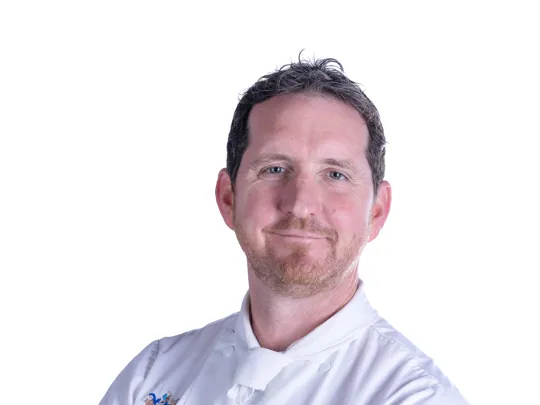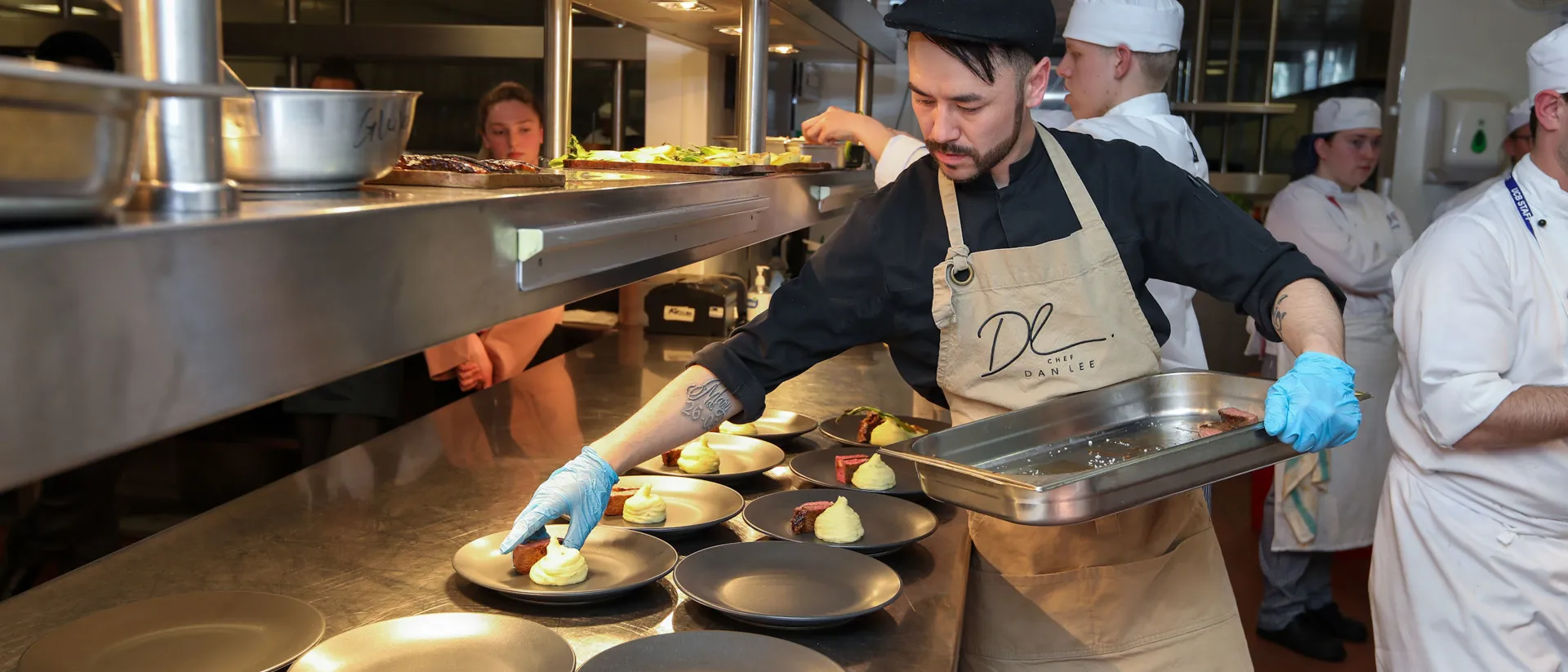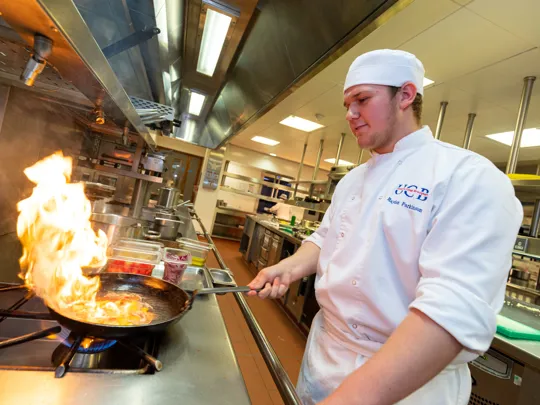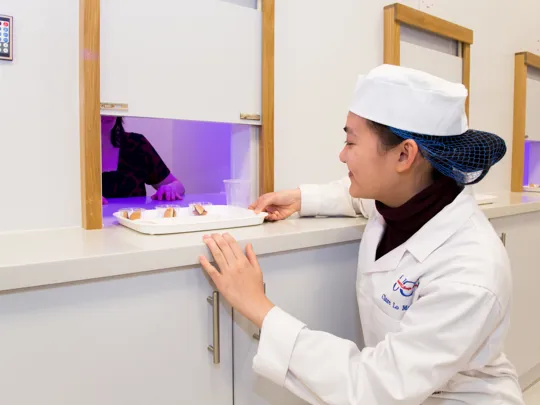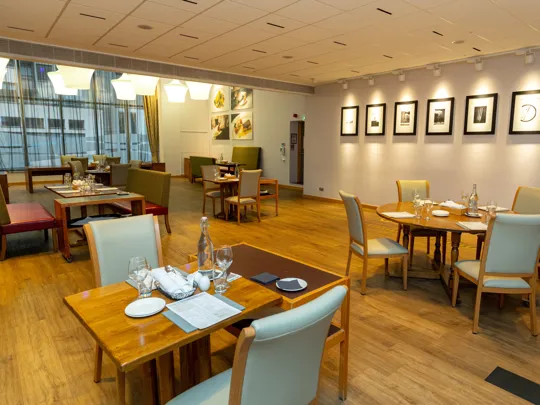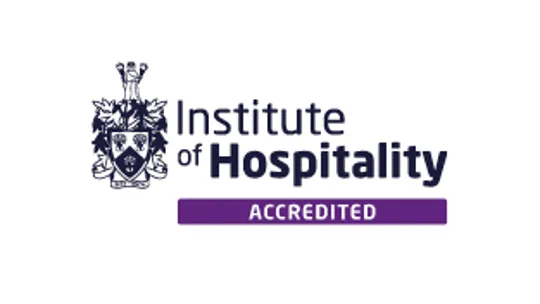of graduate employers say relevant experience is essential to getting a job with them
Why should I choose Culinary Arts Management MA / PGDip?
- WORK PLACEMENT (MA only) – Take up our optional three-month or six-month placement on successful completion of the taught part of the course and get your foot in the door within the food and hospitality industry
- EXPERT TUITION – Draw from our lecturers’ wealth of experience and keep up-to-date with the very latest industry developments and academic research
- EXCELLENT FACILITIES – Develop and apply your skills within our industry-standard kitchen and restaurant facilities on campus
- TOP COURSE FOR POSTGRADUATES – The MA course scored 90% and the PGDip scored 100% for overall positivity in the Postgraduate Taught Experience Survey (PTES) 2025. We also came 9th out of 102 institutions for overall postgraduate support and 8th for community.
Our facilities
University College Birmingham is renowned for its outstanding food industry training facilities. As a student on our Culinary Arts Management master’s degree or postgraduate diploma, you will have access to our professional standard kitchens, award-winning restaurant and state-of-the-art food development facilities.
Course breakdown
- Postgraduate
Core Modules
Culinary Artistry - Creative Techniques
Classical cuisine, rooted in centuries of culinary tradition, has shaped how chefs worldwide approach their craft application. These foundational methods and key principles help professional chefs organise their kitchens, work with fresh ingredients, and create exceptional dishes to the highest standards. In this module, you will explore the complex connection between culinary artistry, modern kitchen management, and innovative approaches in the ever-evolving food industry. You will also hone your skills in classic techniques like roasting, braising, grilling, sautéing, and baking. With a vital focus on using top-quality ingredients, you will have the chance to unleash your culinary creativity to produce intricate dishes paired with perfect garnishes.
International Gastronomy and Food Culture
In this module you will explore the rich and diverse culinary traditions that have developed across the world. You will examine how food is intertwined with culture, history, geography, and socio-political dynamics. The module provides a comprehensive analysis of global food systems, regional cuisines, food rituals, and the globalisation of food. Through an interdisciplinary approach, you will investigate how food serves as both a reflection of and a driver for social, cultural, and economic changes in various societies.
Culinary Innovation and Product Development
Let your creativity flow in designing and developing new, exciting, and innovative food products, based on a brief from a real-life industry scenario - from the initial concept brief to the product launch. This module will provide you with a unique opportunity to gain an in-depth understanding of all the essential technical processes and theoretical models of commercial new food product development. An additional learning focus will include healthier alternatives, considering consumer allergens and special diets e.g. vegan/vegetarian and free-from products.
Managing Across Cultures
Today's global hospitality industry requires leaders to have an understanding of management and leadership across cultures, so you will explore the issues surrounding this in diverse cultures. You will examine the sustainable principles of management including, diversity, equality and equity, management styles, motivation techniques and leadership theories as well as any complexities and contradictions that may occur.
Culinary Challenge Showcase
This module draws inspiration from taught elements of the programme where you will showcase your learning journey and practical skills development. The culmination of this will be the creation of your final food concept and research output in a culinary challenge showcase. This showcase is designed so you can exhibit independent, technical, and critical research skills in a creative and innovative project. The production of this final concept is based on your passion for innovation and research relevant to the dynamic culinary sector culminating in you presenting your culinary concepts to a panel for sensory evaluation.
Plus one option from:
Sustainable Food Systems and Safety
In today’s global culinary and hospitality landscape, food sustainability and regulatory compliance aren’t just important - they're essential. Protecting public health and building consumer trust starts with safe, traceable, high-quality food. Businesses that fail to meet these standards risk devastating recalls, legal consequences, and irreparable damage to their reputation. In this module you will learn how to minimise the risks through conducting food risk assessments using the internationally recognised HACCP framework, master auditing techniques to evaluate food safety and supply chain systems and apply sustainable food management practices that drive operational efficiency and environmental responsibility. Whether you're interested in a role in procurement, quality control, product development, or food innovation, this module offers opportunity to explore a range of sustainable food systems.
Revenue and Performance Analysis
In this module, you will develop a critical perspective of the long and short term decisions faced by senior managers. You will develop a rich understanding of the business and economic environment. You will learn how to analyse financial and operational data to create value for senior stakeholders. In doing so, you will apply a range of financial methodologies and case study research strategies that will advance your capability to make real-time-decisions in the culinary business sector.
Plus one option from:
Creative Future Foods
The world’s population is set to grow at an unprecedented rate, bringing with it global challenges that few have seen before or considered a reality. Just how do we feed such a population? How is this sustainable? In this module you will examine how the human need for food has developed alongside our growing numbers, and how future generations will need to adapt and develop the food chain to feed a growing race.
Beverages and Mixology
This dynamic and hands-on module explores the creation of beverages and mixology with a focus on developing unique drinks for retail markets and culinary businesses. You will learn the fundamental principles of beverage production, mixology, ingredient selection, flavour profiles, and development techniques. The module will allow you to gain valuable insight into the commercial aspects of bringing a new beverage to market. By the end of the module, you will have developed an original beverage, refined it through practical experimentation and the critical review of the beverage concept. You will conduct consumer research and sensory evaluation in preparation for marketing and retail. You will build confidence in experimentation, innovative thinking and mastery of the beverage sector to create a unique product ready for consumers.
Mastering Patisserie
Mastering the art of patisserie takes dedication and years of practice to perfect the intricate technical skills involved. In this practical module, you'll get hands-on experience with a wide variety of professional patisserie techniques. You will develop essential skills to craft stunning pastries that cater to a diverse range of sustainable markets. From classic treats like tarts, mille-feuilles and éclairs to delicate macarons, meringues, and modern plated desserts, you'll explore the full spectrum of pastry artistry. You will also dive into highly classical elements of French patisserie, such as tempering chocolate, working with boiled sugar, and creating elegant petits fours, ensuring a well-rounded foundation in the world of professional pastry production.
Optional Placement
Postgraduate Work Placement
The Postgraduate Work Placement module provides you with the opportunities to further develop practical skills, relate theory to practice and to gain a sound base of experience. In addition, the module seeks to develop 'life skills' to assist you in progressing towards a career in management. The placement period offers you the opportunity to experience work in industry and to gain academic credit for your learning. Your needs and any previous experience are taken into consideration, when supporting you in your placement search. The staff in the Hired department will draw on their extensive experience to ensure that the objectives are met as fully as possible.
The modules listed above for this course are regularly reviewed to ensure they are up to date and informed by industry as well as the latest teaching methods. On occasion, we may need to make unexpected changes to modules – if this occurs, we will contact all offer holders as soon as possible.
Entry requirements
Academic
MA Culinary Arts Management: A grade classification of 2:2 or above is required in one of the following subject areas: Culinary Arts Management, Hospitality Management, Hospitality and Tourism Management, Food Nutrition and Preparation, Food Innovation, Food Technology or Professional Cookery, or international equivalent.
PGDip Culinary Arts Management: A grade classification of third class is required in one of the subject areas above, or international equivalent.
If you do not have a degree in one of the subject areas above, we also offer places based on work experience – please review the section below.
Work-based
We also consider applicants who are currently employed and wish to apply to University College Birmingham.
To apply, you must have 5 years of relevant managerial work experience, demonstrating in-depth knowledge of the sector for the subject matter you are interested in pursuing.
A reference detailing your roles and responsibilities from your line manager and a meeting with the programme team will usually be scheduled prior to a place being offered.
International students
For academic and English entry requirements for EU and international students, please visit the Country Specific Information page.
Please note: As an International Student, when choosing optional placement, a visa extension may be required.
Key information
Teaching and assessment
Note: Indicative information only – actual timetables and assessment regimes will be issued at your induction.
Teaching
Example of a typical teaching week (up to 14 contact hours):
Lectures: 6 hours (in lecture rooms/specialist kitchens)
Seminars and Student Workshops: 1-2 hours
Practical Kitchen Sessions: 4 hours
Group Tutorials: 1 hour
Subject advice sessions: 1 hour
You will also need to commit around 20 hours per week for individual study time.
Assessment
Estimated breakdown of assessment for this postgraduate course:
Coursework: 45%
Practical assessment: 45%
Written examinations: 10%
Our teaching and assessment is underpinned by our Learning and Teaching Strategy 2025-2030.
Timetable
We understand that you need to balance study with work, so wherever possible your lessons will be timetabled into 2-3 days a week for full-time and one day a week for part-time study.
Tuition fees for home students
If you are a home student enrolling on a [Band 2] postgraduate degree course at University College Birmingham in 2025/2026, the tuition fee for full-time study will be £10,350 per year. For part-time study, the fee will be £5,175 per year.
Uniform and kit costs
This course requires a uniform and kit costing approximately £250-350, depending on the items you purchase. (Prices are subject to change each year – exact costs and information on how to order required items will be provided to you prior to enrolment).
Tuition fees for international students
If you are an international student (or have been fee assessed as an international fee payer) and enrolling on a full-time [Band 1] postgraduate degree course in 2025/2026, the fee for the academic year will be £17,000. If you complete a placement year, there will be an administration fee of £500 for a full year or £250 for a half-year placement.
Unibuddy Community - meet other students on your course
Starting university is an exciting time, but we understand that it can sometimes feel a little daunting. To support you, you will be invited to join our Unibuddy Community, where you can meet other students who have applied for the same course at University College Birmingham, before you start studying here.
As soon as you have been made an offer, you will be sent an invitation email to complete your registration and join the Unibuddy Community. For more information, check out our Unibuddy Community page.
Accreditations, endorsements and partnerships
University College Birmingham works with a wide range of organisations to ensure you receive the best possible training and qualifications recognised by industry.
Work placements
Work placements are vital for gaining real-life experience and for building your confidence and skills before you finish your course – and they may even lead to a job when you graduate.
Our MA Culinary Arts Management course features an optional three-month or six-month placement on successful completion of the taught part of the course, with opportunities in the UK or overseas. You are required to secure your own placement with the support of our experienced HIRED team.
Note: Students on the PGDip course, or those planning to top-up from a PGDip to a master's degree, will not be eligible for a placement during the course.

"I wanted a qualification that would prepare me for the real world. University College Birmingham seemed like the best place for that. One of the best things is learning directly from brilliant chefs in an environment that allows you to gain real insight into what it’s like to work in industry."
Career opportunities
The example roles and salaries below are intended as a guide only.
Sous chef
Average salary: £30,000 - £40,000
Head chef
Average salary: £35,000 - £50,000
Catering manager
Average salary: £22,000 - £45,000
Product development chef
Average salary: £25,000 - £40,000
Restaurant manager
Average salary: £22,000 - £40,000
Food business owner/restaurateur
Variable

Garima’s Story
A celebrity in India, Garima wanted to study for her master’s at a university with “the best culinary courses in the world”.
Meet your lecturers


